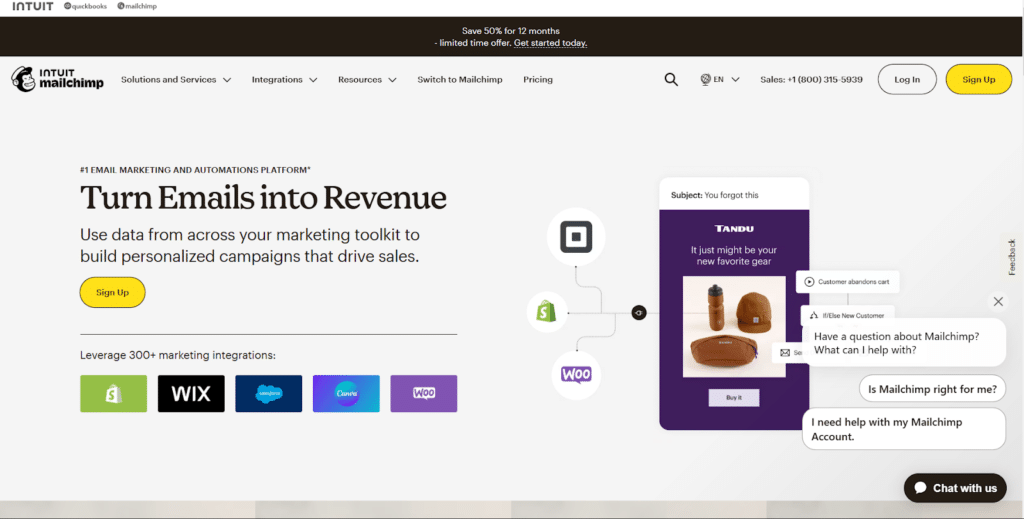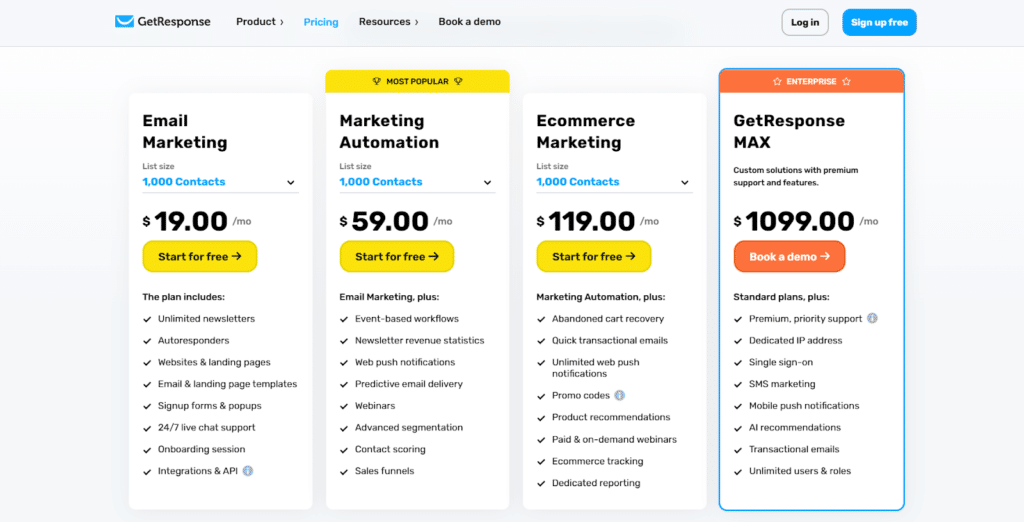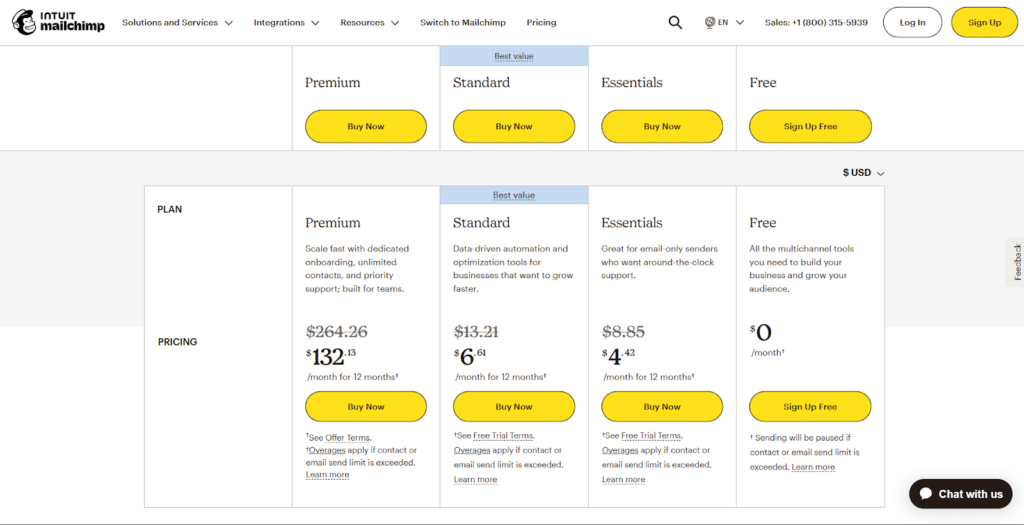GetResponse vs Mailchimp: A Comprehensive Platform Comparison
When it comes to email marketing platforms, GetResponse and Mailchimp stand out as popular solutions for businesses of all sizes. Both offer powerful features to help you connect with your audience, but they differ in key areas that might make one a better fit for your specific needs. This detailed comparison will help you determine which platform aligns better with your marketing goals and budget.
Overview of GetResponse

Get Started with Mighty GetResponse🔥
GetResponse is an all-in-one marketing platform that goes beyond basic email marketing. It offers a comprehensive suite of tools including email marketing, automation, landing pages, webinars, sales funnels, and CRM capabilities. The platform is designed to help businesses automate their marketing efforts, generate leads, and increase conversions through integrated marketing solutions.
Key Features of GetResponse
- Advanced Email Marketing: Create professional newsletters with an intuitive drag-and-drop editor, responsive email templates, and dynamic content options.
- Marketing Automation: Build sophisticated workflows based on subscriber behavior, engagement, and preferences.
- Conversion Funnels: Create complete sales funnels from lead generation to sale completion with built-in tools.
- Webinar Hosting: Host webinars directly within the platform to engage audiences and generate leads.
- Landing Page Builder: Design high-converting landing pages with A/B testing capabilities.
- Autoresponders: Set up automated email sequences triggered by specific actions or timeframes.
- CRM Integration: Manage contacts and track customer journeys within the platform.
- E-commerce Features: Integrate with popular e-commerce platforms and track sales performance.
Ideal User Base for GetResponse
- Small to medium-sized businesses looking for an all-in-one marketing solution
- Digital marketers seeking advanced automation capabilities
- Online course creators and coaches utilizing webinars as part of their strategy
- E-commerce businesses requiring sales funnel optimization
- Companies focusing on lead generation and conversion optimization
Overview of Mailchimp

Get Started with Mighty Mailchimp🔥
Mailchimp has evolved from a simple email marketing tool to a comprehensive marketing platform. It offers intuitive email marketing solutions, audience management, automation, and insights to help businesses of all sizes grow their customer base and increase engagement.
Key Features of Mailchimp
- User-Friendly Interface: An intuitive platform designed for beginners and experienced marketers alike.
- Email Templates: A wide array of customizable templates for various campaign types.
- Audience Management: Segmentation tools to target specific groups within your audience.
- Marketing Automation: Create customer journeys with behavioral-based automation.
- Content Studio: Store and organize your marketing assets in one centralized location.
- Landing Pages: Build mobile-responsive landing pages to capture leads.
- A/B Testing: Test different versions of your campaigns to optimize performance.
- Analytics: Comprehensive reporting to measure campaign effectiveness.
- Social Media Integration: Connect social channels to expand your marketing reach.
Ideal User Base for Mailchimp
- Small businesses and startups looking for an easy-to-use platform
- E-commerce businesses needing strong integration capabilities
- Content creators and bloggers looking to grow their audience
- Marketers who prioritize intuitive design and user experience
- Businesses with growing subscriber lists requiring scalable solutions
Core Functionalities Comparison
When choosing between GetResponse and Mailchimp, understanding their core functionalities is essential for making an informed decision.
1. Email Marketing Capabilities
GetResponse offers a robust email creation experience with an intuitive drag-and-drop editor. Users can choose from 500+ professionally designed templates or create emails from scratch. The platform supports dynamic content, personalization, and mobile optimization. GetResponse also provides advanced features like perfect timing (sending emails when subscribers are most likely to open them) and time travel (delivering emails at a specific local time regardless of recipient location).
Mailchimp is known for its user-friendly email designer with a wide variety of customizable templates. The platform makes it easy to create visually appealing campaigns with its Content Studio for asset management and Brand Kit for consistent messaging. Mailchimp offers similar personalization options but stands out with its Creative Assistant that uses AI to generate designs based on your brand.
2. Automation and Workflow
GetResponse excels in marketing automation with its visual workflow builder that allows users to create complex, multi-step automation sequences. The platform offers a variety of triggers, actions, and conditions to create personalized customer journeys. GetResponse also includes pre-built automation templates for common scenarios like welcome series, abandoned cart recovery, and re-engagement campaigns.
Mailchimp provides a straightforward automation builder with a focus on accessibility for beginners. While not as advanced as GetResponse, Mailchimp offers pre-designed customer journeys and the ability to create custom workflows based on subscriber activity. The platform's automation capabilities are sufficient for most small to medium-sized businesses but may lack some of the advanced features found in GetResponse.
3. Landing Pages and Forms
GetResponse includes a powerful landing page builder with 180+ templates designed for various campaigns and industries. The drag-and-drop editor allows for extensive customization without coding knowledge. GetResponse also offers A/B testing, mobile optimization, and integration with payment processors. The platform's form builder supports various types of forms including pop-ups, exit intent, and embedded forms.
Mailchimp provides a user-friendly landing page builder with fewer templates but strong customization options. The platform includes basic A/B testing capabilities and mobile responsiveness. Mailchimp's form options are slightly more limited but still cover the essentials with pop-up forms, embedded forms, and landing page forms.
4. Webinar Functionality
GetResponse stands out with its built-in webinar functionality, allowing users to host webinars directly within the platform. This feature includes registration pages, reminder emails, recording capabilities, and attendee management. The seamless integration with other GetResponse features makes it easy to incorporate webinars into your overall marketing strategy.
Mailchimp does not offer native webinar hosting. Users who want to include webinars in their marketing strategy need to integrate with third-party webinar platforms like Zoom or GoToWebinar, creating potential workflow complications and additional costs.
5. CRM and Sales Functionality
GetResponse includes a basic CRM system that allows users to track deals through a visual pipeline, store contact information, and track interactions. The platform also offers sales funnel capabilities with pre-designed templates for various conversion goals. While not as robust as dedicated CRM software, GetResponse provides sufficient functionality for small to medium-sized businesses.
Mailchimp offers customer relationship management tools focused on audience insights rather than sales pipelines. The platform provides customer journey visualization, purchase history tracking, and audience segmentation. Mailchimp's recent additions include Customer Journey Builder and Customer Lifetime Value prediction, enhancing its CRM capabilities.
Pricing Comparison: GetResponse vs Mailchimp
Understanding the pricing structures of both platforms is crucial for making a cost-effective decision based on your business requirements.
GetResponse Pricing Plans

GetResponse offers a tiered pricing structure based on features and list size:
Email Marketing Plan (Starting at $19/month for 1,000 contacts)
- Unlimited newsletters
- Autoresponders
- Basic segmentation
- Landing pages
- Forms and surveys
- One sales funnel
Marketing Automation Plan (Starting at $59/month for 1,000 contacts)
- Everything in Email Marketing
- Advanced segmentation
- Marketing automation
- Webinars (up to 100 attendees)
- Contact scoring and tagging
- 5 sales funnels
E-commerce Marketing Plan (Starting at $119/month for 1,000 contacts)
- Everything in Marketing Automation
- Web push notifications
- E-commerce segmentation
- Promo codes
- Product recommendations
- Facebook Ads
- Unlimited sales funnels
Max Plan ($1099/month)
- Everything in E-commerce Marketing
- Transactional emails
- Dedicated support
- Deliverability consulting
- Webinars for up to 500 attendees
- Single sign-on (SSO)
GetResponse offers discounts for annual (18%) and biennial (30%) payments. They also provide a 30-day free trial and a free plan for up to 500 contacts with limited features.
Mailchimp Pricing Plans

Mailchimp's pricing structure is also based on features and list size:
Free Plan (Up to 500 contacts)
- Basic email campaigns
- 1 audience
- 7 marketing channels
- Basic templates
- Website builder
- Creative Assistant
Essentials Plan (Starting at $4.43/month for 500 contacts)
- Everything in Free
- All email templates
- A/B testing
- Custom branding
- Multi-step journeys
- 24/7 support
Standard Plan (Starting at $6.64/month for 500 contacts)
- Everything in Essentials
- Behavioral targeting
- Custom templates
- Dynamic content
- Send time optimization
- Customer journey builder
Premium Plan (Starting at $132.13/month for 10,000 contacts)
- Everything in Standard
- Advanced segmentation
- Multivariate testing
- Comparative reporting
- Phone support
- Role-based access
Mailchimp's pricing increases as your subscriber count grows, which can become costly for larger lists. They do not offer discounts for annual payments.
Making the Right Choice for Your Business
Choosing between GetResponse and Mailchimp depends on your specific marketing needs, budget, and growth plans.
Choose GetResponse if:
- You need an all-in-one platform for email marketing, webinars, and sales funnels
- Advanced automation workflows are essential to your strategy
- Webinar hosting is a key component of your marketing efforts
- You want a more cost-effective solution for growing subscriber lists
- Sales funnel integration is important for your business model
Choose Mailchimp if:
- User-friendly interface and ease of use are top priorities
- You're starting with a small list and basic email marketing needs
- Strong e-commerce integrations are crucial for your business
- You value robust analytics and reporting capabilities
- Brand consistency and design features are important to your marketing
Both platforms offer powerful features for email marketing and audience engagement, but they cater to different needs and expertise levels. GetResponse provides more advanced features and better value for growing businesses, while Mailchimp excels in user experience and integration capabilities for beginners and small businesses.
Evaluate your specific requirements, compare the pricing based on your current and projected subscriber count, and consider which features are most important for your marketing strategy before making your final decision.